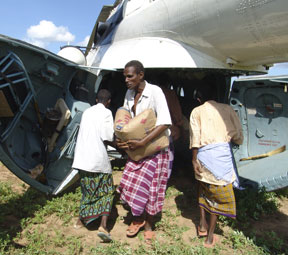Humanitarian and Disaster Relief Assistance
Whenever there is a disaster or a humanitarian catastrophe, the UN is on the ground providing relief, support and assistance.From the population displacements caused by war, weather and natural disasters, to the impact of such disruptions on health, hygiene, education, nutrition and even basic shelter, the UN is there, making a difference.
Thanks to the World Food Programme (WFP) and the Food and Agriculture Organization of the UN (FAO), food is made available to those who might otherwise starve. Thanks to the Office of the UN High Commissioner for Refugees (UNHCR) and the International Organization for Migration (IOM), camps and other facilities are set up and maintained for those who have been forced to leave their homes.

When men, women and children are trapped in the midst of war, the Secretary-General and his representatives help negotiate “zones of peace” for the delivery of humanitarian aid. And UN peacekeepers protect the delivery of that aid — whether provided by members of the UN system or such humanitarian bodies as the International Federation of Red Cross and Red Crescent Societies.
The World Health Organization (WHO) helps protect those displaced by natural and man-made disasters from the ravages of disease. The United Nations Children’s Fund (UNICEF), with the aid of such bodies as the International Save the Children ![]() Alliance, provides education for children who have been uprooted by calamity. And when it is time to begin rebuilding, the United Nations Development Programme (UNDP) is there to ensure that the recovery process has a firm and stable footing.
Alliance, provides education for children who have been uprooted by calamity. And when it is time to begin rebuilding, the United Nations Development Programme (UNDP) is there to ensure that the recovery process has a firm and stable footing.
The humanitarian and disaster-relief efforts of the UN system are overseen and facilitated by the Office for the Coordination of Humanitarian Affairs (OCHA), led by the United Nations Emergency Relief Coordinator. Among its many activities, OCHA provides the latest information on emergencies worldwide, and launches international “consolidated appeals” to mobilize financing for the provision of emergency assistance in specific situations.
“Today, we recognize the millions of people who count on us for their very survival. The one billion people afflicted by hunger. The tens of millions forced to flee their homes because of disaster and conflict.
The children who die from diseases we know how to cure. The women and girls who are brutalized by sexual violence. We need to tackle these problems at their root. But until we do, lives will hang in the balance. And the humanitarian community will be on the scene, rushing bravely towards danger, determined to help people in need."Secretary-General Ban Ki-moon
Remarks to launch the first World Humanitarian Day
UN Headquarters, 19 August 2009
A key player in coordinating this assistance is the Inter-Agency Standing Committee (IASC), which brings together all major humanitarian agencies, both within and outside the UN system. Chaired by the Emergency Relief Coordinator, it develops policies, agrees on the division of responsibilities among humanitarian agencies, and works to make the process as efficient as possible. Its “cluster approach” to the division of responsibilities in the face of disaster has revolutionized the provision of humanitarian aid.
Beyond all this, the UN system works to prevent disasters whenever possible, whether natural or man-made. A major man-made cause of human pain is war and conflict, and the UN works on the diplomatic front to prevent and resolve the human tragedy of war. It helps country’s set up early warning systems to give them time to prepare for an expected assault by the elements. And the UN is in the forefront of addressing the perils of climate change, which has already begun to increase the number and intensity of “natural” disaster situations worldwide.
It has been said that, in the face of life’s most unacceptable situations, “If you’re not part of the solution, you’re part of the problem.” In all of the global issues on its agenda — and especially with respect to emergency assistance for the protection of human life — the UN is part of the solution. A very big part.
By General Assembly resolution 63/139 of 11 December 2008, World Humanitarian Day is observed annually on 19 August, in order to increase public awareness about humanitarian assistance activities worldwide and the importance of international cooperation in this regard, as well as to honour all humanitarian and United Nations and associated personnel who have worked in the promotion of the humanitarian cause and those who have lost their lives in the cause of duty.
By General Assembly resolution 44/236 of 22 December 1989, the International Day for Natural Disaster Reduction is observed the second Wednesday of October.